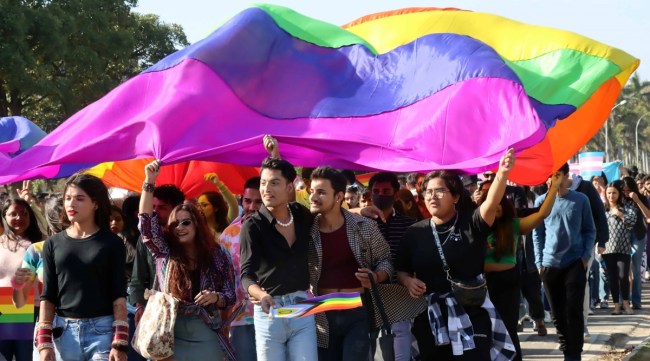Opinion Tahir Mahmood on same-sex marriage: Existing matrimonial law should be left exclusively for the ‘sanskaar’ called ‘marriage’
Under the Special Marriage Act and the Hindu Marriage Act, the law is already modern; there is no rationale for making it ultramodern by extending its provisions to same-sex marriages
 The stand of the country’s present rulers and their leading ideologues, in this context, has since been described by observers as “sympathetic acceptance rather than inclusion.” (Express Photo by Kamleshwar Singh)
The stand of the country’s present rulers and their leading ideologues, in this context, has since been described by observers as “sympathetic acceptance rather than inclusion.” (Express Photo by Kamleshwar Singh) The demand for the legal recognition of so-called same-sex marriages is now before a Constitution Bench of the apex court. The central government has opposed it, saying that it would cause “complete havoc” in the accepted societal values of the nation since the notion of marriage “necessarily and inevitably” presupposes a union between two persons of the opposite sex. As constitutional justifications for the stand, it has been claimed that the principle of legitimate State interest overriding its duty to protect citizens’ fundamental rights — personal liberty in this case — does apply to the matter and that there is an “intelligible differentia” to distinguish between heterosexual couples and same-sex partners. As parties to a homosexual union may adopt children, the government counsel has pointed out its likely impact, to which the CJI’s reported response was that such a child need not necessarily be homosexual. I am afraid the counsel’s genuine concern was not duly appreciated, which actually was about the embarrassment that the adoptees of same-sex partners may face in society at large.
Senior advocate Indira Jaising, my former classmate in London, has criticised the government’s stand and urged the court to unhesitatingly recognise what is called same-sex marriage (‘Unions of our own choice’, IE, March 15). With due deference to her views and sentiments, I have an urge to speak otherwise.
The British law-based Indian Penal Code of 1860 did not view consensual sex between a man and a woman (even without a matrimonial relationship) as an offence. On the other hand, sexual activity between partners of the same sex, including that with their free consent, was declared to be an offence (Section 377). In the Naz Foundation case of 2009, Delhi High Court judge A P Shah held that this outdated IPC provision, to the extent it covered consensual sex, was ultra vires the Constitution of present-day India. After showing reluctance for several years, the Supreme Court eventually fell in line (Navtej Johar, 2018). This was, of course, a very logical decision — if two men or two women willfully make love to each other, why should the State poke its nose into it?
The stand of the country’s present rulers and their leading ideologues, in this context, has since been described by observers as “sympathetic acceptance rather than inclusion.” Now, reacting to the new case before the Supreme Court, they seem to be saying that living together in such cases is fine but recognising their relationship as a “marriage” would be erroneous as married couples live together “not only for themselves but for the family and for social good”.
My critics may smell a rat in it and attribute motives, but in this matter, I am in complete agreement with the government’s viewpoint. The sanctity of, and reverence for, marital relationships is well-established in our society. The Supreme Court has observed that marriage is “highly revered in India and we are a nation that prides itself on the strong foundations of our marriages” (Kollam Chandra Sekhar v Kollam Padma Latha, 2013). A high court has ruled that “marriage has a bearing not only upon two individuals but also among their family members and the society because family is a unit in the society” (G Durga, 2013). The government’s stand is clearly in tune with these, and many other similar, judicial observations.
Under the Special Marriage Act 1954, “any two persons” — and under the Hindu Marriage Act 1955 “any two Hindus” — can marry, subject to prescribed conditions. These words have always been understood to mean a marriage between a man and a woman. The law under the two Acts — which is more or less the same — is already excessively modern; there is no rationale for making it ultramodern by extending its provisions to so-called same-sex marriages.
There are prevalent in some parts of India forms of personal partnership other than the sacrosanct matrimonial unions — for example, maitri karar (friendship pact) in Gujarat and nata pratha (relation assumed by custom) in Rajasthan. There is also now the concept of live-in relationship fully recognised by law in respect of the partners’ rights and obligations. Such exceptional partnerships are generally heterosexual, but there is nothing in any law barring their use by homosexual couples. In any case, the law of India does not stop homosexual partners from living together as a family on mutually settled terms. On the contrary, there have been cases decided by the courts in favour of their right to cohabitation. In 2018, the Kerala High Court accepted the plea of a lesbian couple for a writ of habeas corpus to reinstate the partner who had been forcibly separated from the other.
Since the beginning of the present millennium, several countries have enacted special laws for homosexual unions — using for them expressions like civil union, civil partnership, domestic partnership and registered partnership. Here in India, we now have a law called the Transgender Persons (Protection of Rights) Act 2019, which may be suitably amended to incorporate in it the necessary provisions for the regulation of homosexual unions and the protection of mutual rights and obligations of partners in such unions. These are a special category different from the socially predominant norm of heterosexual unions and should, in the fitness of things, be governed by a special law.
To friends seeking inclusion of so-called same-sex marriages under the general marriage laws I would say, with respect, do live with whoever you want as per your mutually agreed terms — for the whole of your lives if you wish — and the State will duly safeguard your rights. But why on earth should you insist on your extraordinary relationship being treated as a marriage covered by the laws regulating the sacred husband-wife relations that are clothed with a deeply spiritual aura? The State may, of course, enact a separate law for homosexual unions but the existing matrimonial laws should in my opinion be left exclusively for the sanskaar called “marriage” in our society.
The author is a professor of Law and an ex-member, the Law Commission of India





